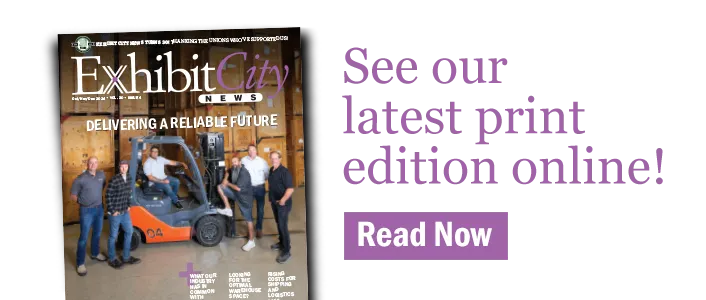Technology and the future of the exhibit transportation industry go hand-in-hand. New tracking software is globalizing the industry and allowing clients to follow their own shipments to and from the show floor.
The following Q&A discusses transportation technology and the future of this industry segment that has no choice but to move forward.
The industry experts that will share their observations include Drey Lucibello from Champion; Greg Keh, executive vice president of TWI Global; and Jason Gaon, president of Global Expo Transit.
How has technology improved the exhibit transportation industry?
 Drey Lucibello, Champion Logistics Group: Most recently, green technologies that improve the efficiencies of trucking equipment have been an obvious benefit to the common goal that we all share in helping the planet. Another improvement in the exhibit transportation industry in recent years has been the ability of transportation providers to track the status of equipment for on-time performance in order to communicate with the client and I&D professionals.
Drey Lucibello, Champion Logistics Group: Most recently, green technologies that improve the efficiencies of trucking equipment have been an obvious benefit to the common goal that we all share in helping the planet. Another improvement in the exhibit transportation industry in recent years has been the ability of transportation providers to track the status of equipment for on-time performance in order to communicate with the client and I&D professionals.
Furthermore, there are great strides being made by the general contractors that have been developing better systems that communicate delivery/pick-up status information to the exhibitor in more convenient ways. Because (on rare occasions) we have seen situations where the status provided on the show floor does not match up with the marshaling yard, it is important to remember that you have a trustworthy carrier that has effective communication, as the information on site is only as good as the human element entering the data in the system. When you have hundreds of trucks checking in to the marshaling yard, there may very well be a back log of data entry that has to be completed before the information is current, so you should be communicating directly with your transportation provider.
Jason Gaon, Global Expo Transit: As technologies have advanced, it has allowed for better vehicles of transportation and dispatch software. This has allowed us and our carriers to provide safer over-the-road transportation and to be able to efficiently fill the trailers. This allows us to perfectly time the arrival of the freight and to deliver to the convention site at the required time of delivery.
Is there anything in the exhibit transportation business you wish the industry was more educated about?
Greg Keh, TWI Global: I believe that the exhibitors and clients are educated very well. They are driving the business model about flexibility, freedom and choice. They are applying all the technologies they have in their own experiences and creating the demand and expectations in our own businesses. The industry, in terms of us as providers of service, has to be much more flexible to meet the demands of the exhibitors and clients. In this regard, it is not about being educated about a certain thing, but about certain behaviors. Otherwise, if we were to focus on facts and processes, I would say that we all have to be much better educated about security, administrative impact of compliance with U.S. Security, as well as compliance with government regulations, which have increased since 9/11.
Lucibello: It is important to remember that exhibit transportation is a specialty that not every organization can fulfill. Because there are many parties involved in the logistical success of a timely move in and out of a show, all of the players need to be organized and educated on the general contractor’s requirements. Doing so improves the overall efficiencies of the program as the transportation providers have to follow the rules of the general contractor who is inevitably responsible for the coordination of the before mentioned. Exhibit managers should remember that it is good practice to hold the appropriate party accountable for their portion of the services that they have agreed to provide in order to earn your trust and loyalty as a partner in the tradeshow arena.
educated on the general contractor’s requirements. Doing so improves the overall efficiencies of the program as the transportation providers have to follow the rules of the general contractor who is inevitably responsible for the coordination of the before mentioned. Exhibit managers should remember that it is good practice to hold the appropriate party accountable for their portion of the services that they have agreed to provide in order to earn your trust and loyalty as a partner in the tradeshow arena.
Gaon: Not so much about our industry or the professionals involved in it, but about how the exhibitors don’t put the correct people in charge of their freight transportation. They have no understanding that it differs completely from business to business freight.
What will be some of the biggest changes in the way freight is handled over the next few years?
Keh: There will not be many changes. I feel that the method of handling freight is going to be the same physically. There is not much that I am aware of that may significantly change this. The transportation industry has evolved over the last 100 years. I believe that technology will impact things greatly. We are all hearing of RFID technology to track packages. Perhaps this will allow vendors and clients to instantaneously know where their materials are at all times, which could significantly assist the entire industry.
Gaon: I think as technology changes, we will be able to locate lost freight more rapidly, and we will able to interface more with our freight. Possibly smart freight: Freight being able to tell the shipper the location or how long the freight traveled or even how many times the freight was picked up and moved. Sounds more science fiction, but who knows?
Related news: New trends equal new challenges in exhibit transportation































